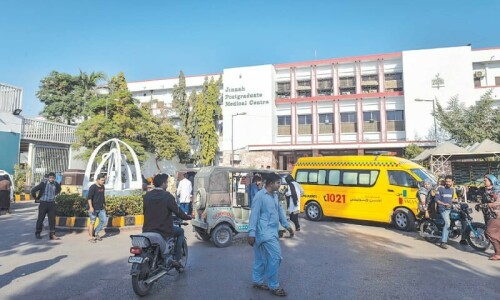THATTA: Water experts, environmentalists and leaders of various nationalist groups speaking at a water conference held in the local press club on Saturday urged all stakeholders to intervene to prevent the building of new dams over River Indus as this would have serious repercussions.
The speakers were of concerted view that if any new dam was built, this would totally destroy Indus delta and cause further degradation of the region’s ecology. Moreover, they said, a decision to build a dam or barrage over the river was bound to widen the gulf between Punjab and Sindh — two major federating units — which would be detrimental to the country’s interest.
They said all stakeholders should sit together to discuss and resolve the issue as people of Sindh opposed the very idea of building any dam or barrage over Indus.
Those who spoke at the conference included Pakistan Fisherfolk Forum (PFF) chairman Mohammad Ali Shah, former Sindh irrigation secretary and a water expert Mir Mohammad Parhiar, Jeay Sindh Tehreek-Karnani (JST-K) general secretary Prof Mushtaq Mirani, JST-Safdar Sarki group leader Sorhe Sindhi, Fateh Channa, Engineer Obhayo Khan Khushik, Abdullah Murghar, Sarwar Palijo and Shahzado Otho, besides the host, Nawaz Khan Zaunr.
In his keynote speech, Mr Zaunr shed light on all aspects of the issue and described the very concept of new dam as the first step towards inviting a man-made crisis in the province. He said it seemed to be aimed at usurping Sindh’s natural resources and depriving its population of their livelihood and mainstay, ie agriculture. Proponents of the idea wanted to gain practical hold of the deltaic region, he said, and warned that Sindh would never accept such a plan evolved under a hidden agenda in the name of “national interest”.
He repeated all Sindhi nationalist groups’ demands that Sindh’s due share in water and flow of required quantum downstream Kotri be ensured. Besides, he added, the authorities concerned should take steps to restore the entire natural route of water in this province. This, he said, was necessary to maintain and strengthen harmonious relations between each of the federating units.
PFF chairman Mohammad Ali Shah told the audience that no doubt Pakistan was equally facing a shortage of water along with a number of other countries of the world but the issue here was one of judicious distribution and sharing of Indus water. He described the ongoing practice of water distribution as “controlled mechanism” to the disadvantage of smaller federating units. “No official excuses are acceptable to most stakeholders,” he said.
Mr Shah pointed out that out of 292 major rivers of the world, Indus and only two others had a delta along their routes. “Indus fills the delta in the twin districts of Thatta and Sujawal,” he said, adding that “due to sea intrusion along Sindh’s coastline over the last three decades, more than 1.7 million acres of fertile land has vanished”.
The PFF chairman went on to say that sea intrusion was also destroying mangroves forests and fish and shrimp hatcheries, besides causing rapid hyper-salinity. He pointed out that migration of fishermen communities from the affected coastal areas was going on for decades. The local population could not bear the situation anymore, he added.
Former irrigation secretary Mir Mohammad Parhiar gave his opinion that construction of the proposed Sindh barrage would prove counter-productive. He felt that the purpose of floating the idea was to facilitate execution of controversial mega project of Zulfikarabad.
Referring to Wapda’s claim that 27 million acre feet (MAF) water had been released into Indus, Mr Parhiar said it was meant to befool the people of Sindh. As a matter of fact, only 10 MAF was released, he claimed, and argued that how could such a huge quantum of water downstream be released amid a water crisis that the entire country was faced with.
Technocrat Haleem Magsi, Prof Mushtaq Mirani, Sindh Culture Forum chairman Sadiq Lakho and others were of the view that climate change, melting of glaciers and lack of water management in public and private sectors as well as lack of awareness in masses were other factors contributing to the water crisis.
They called for evolving and implementing of wise policies to effectively overcome the crisis.
Published in Dawn, December 1st, 2019













































Dear visitor, the comments section is undergoing an overhaul and will return soon.